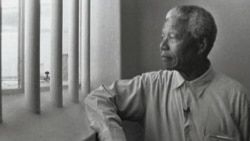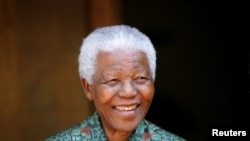Former South African President Nelson Mandela has died at the age of 95. People around the world are mourning the loss of the country's first black president.
To many, Mandela was a hero, a man of courage, conviction and vision. He was often called humble, charming, loyal and a man who cared about others.
"He seemed to have that special charismatic approach," said Herman Cohen, U.S. assistant secretary of state for Africa from 1989 to 1993. "He became the symbol in the fight against apartheid."
Mandela was born on July 18, 1918. As a young man he became active in the anti-apartheid movement and joined the African National Congress, or ANC, in the 1940s.
The white-led government banned the ANC in 1960, but the group continued to operate secretly. Mandela became head of the group's new military wing, coordinating a sabotage campaign against South African military and government targets.
In 1962, he was arrested and put on trial for his actions and sentenced to life in prison on Robben Island off the coast of Cape Town. He spent 18 years there, refusing a government offer to release him if he would renounce the ANC's armed struggle. But he was freed in 1990 after South African President Frederik de Klerk legalized all political parties and discharged most political prisoners.
Shortly after his release, Mandela was elected president of the African National Congress. And in 1994, when the ANC won South Africa's first all-race elections, he was inaugurated as the county's first black president at age 75.
"Never, never and never again shall it be that this beautiful land will again experience the oppression of one by another," he said.
President Mandela said he would stay for only one five-year term. Cohen says Mandela earned international respect for South Africa's national reconciliation.
"Mandela devoted himself mainly to rallying the Africans to this new era to work on economic development, having good education, also he was very much of a spokesman on the international scene." he said.
In 1993, Mandela shared the Nobel Peace Prize with his once bitter enemy de Klerk for their contribution to the peace process in South Africa. After receiving the award, Mandela praised the South African people.
"All have created a society which recognizes that all people are born equal," he said.
During his presidency, Mandela was criticized for not confronting South Africa's AIDS epidemic. However, in his later years, he became a public advocate in the fight against AIDS.
"Together we can fight AIDS and ensure a more secure future for everyone," he said.
He also continued his work as an advocate for children’s rights.
In a country torn apart by years of racial conflict, Nelson Mandela is considered a remarkable leader - a man who turned South Africa away from violence and hatred into a country of greater peace and understanding.
To many, Mandela was a hero, a man of courage, conviction and vision. He was often called humble, charming, loyal and a man who cared about others.
"He seemed to have that special charismatic approach," said Herman Cohen, U.S. assistant secretary of state for Africa from 1989 to 1993. "He became the symbol in the fight against apartheid."
Mandela was born on July 18, 1918. As a young man he became active in the anti-apartheid movement and joined the African National Congress, or ANC, in the 1940s.
Nelson Mandela
Nelson Mandela- 1918 - Born in Transkei, South Africa
- 1944 - Joined African National Congress
- 1956 - Charged with treason, later acquitted
- 1962 - Convicted of sabotage and sentenced to 5 years
- 1964 - Sentenced to life in prison for plotting to overthrow the government
- 1990 - Released from prison
- 1991 - Elected president of ANC
- 1993 - Won Nobel Peace Prize
- 1994 - Elected president of South Africa
- 1999 - Decided not to seek a second term as president
- 2004 - Retired from public life
- 2007 - Formed The Elders group
- 2011 - Briefly hospitalized for a chest infection
- 2012 - Hospitalized again,this time for gallstones
- 2013 - Treated for a recurring lung infection, dies on Dec. 5
In 1962, he was arrested and put on trial for his actions and sentenced to life in prison on Robben Island off the coast of Cape Town. He spent 18 years there, refusing a government offer to release him if he would renounce the ANC's armed struggle. But he was freed in 1990 after South African President Frederik de Klerk legalized all political parties and discharged most political prisoners.
Shortly after his release, Mandela was elected president of the African National Congress. And in 1994, when the ANC won South Africa's first all-race elections, he was inaugurated as the county's first black president at age 75.
"Never, never and never again shall it be that this beautiful land will again experience the oppression of one by another," he said.
President Mandela said he would stay for only one five-year term. Cohen says Mandela earned international respect for South Africa's national reconciliation.
"Mandela devoted himself mainly to rallying the Africans to this new era to work on economic development, having good education, also he was very much of a spokesman on the international scene." he said.
In 1993, Mandela shared the Nobel Peace Prize with his once bitter enemy de Klerk for their contribution to the peace process in South Africa. After receiving the award, Mandela praised the South African people.
"All have created a society which recognizes that all people are born equal," he said.
During his presidency, Mandela was criticized for not confronting South Africa's AIDS epidemic. However, in his later years, he became a public advocate in the fight against AIDS.
"Together we can fight AIDS and ensure a more secure future for everyone," he said.
He also continued his work as an advocate for children’s rights.
In a country torn apart by years of racial conflict, Nelson Mandela is considered a remarkable leader - a man who turned South Africa away from violence and hatred into a country of greater peace and understanding.






